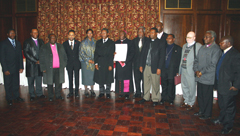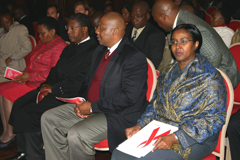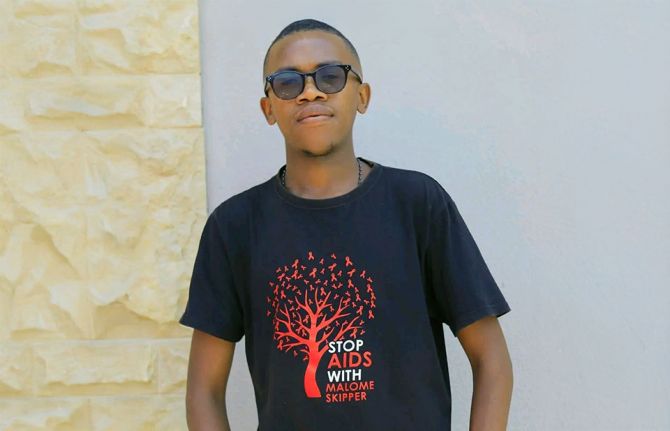
Feature Story
Lesotho’s church leaders step up AIDS response
18 July 2007
18 July 2007 18 July 2007
Lesotho Church Leaders together with the Right
Honorable the Prime Minister, Mr. Pakalitha
Mosisili, Mrs. Hodan Haji Mohamed, UN Resident
Coordinator and Mr. Mahesh Mahalingam,
UNAIDS Lesotho Country Coordinator.
Photo credits: UNAIDS
Fourteen prominent church leaders in Lesotho have signed a statement of commitment on AIDS, pledging to confront the epidemic and to support people living with HIV in a united front.
In the presence of His Majesty King Letsie III and the Rt. Honorable Prime Minister Bethuel Mosisili, the religious leaders underlined their commitment to help Lesotho achieve universal access to HIV prevention, treatment, care and support.
The Kingdom of Lesotho has one of the highest HIV prevalence in the world, with 23.2% of people aged 15-49 estimated to be living with HIV. According to the National AIDS Commission (NAC) and UNAIDS, some 29,000 new infections are estimated to occur in 2007.
In Lesotho – as across Africa – religious organizations provide a considerable percentage of care and support for people living with HIV as well as education and care for children and orphans affected by HIV. About 90% of schools in Lesotho are owned by the church as well as over 50% of hospitals.
In most communities, especially those in rural parts of the country, religious leaders play an important role in people’s lives; they are seen as spiritual pillars and are a trusted source of guidance, moral support and advice on everyday issues. "Bishops, reverends and pastors provide spiritual and psychological support to families and children affected by HIV, especially orphaned and vulnerable children. They also help mobilize community support and overcome silence, denial and fear,” said Mahesh Mahalingam, UNAIDS Country Coordinator in Lesotho.
Speaking at the signing of the declaration, Presiding Superintendent, Reverend Mokhakhlane, from the Lesotho Evangelical Church, underlined the need for urgent action on AIDS from religious leaders. “The tragic toll of the AIDS epidemic, brings compelling urgency to the call for a renewed commitment by religious leaders to achieve universal access for all to HIV prevention, treatment, care and support as well as impact mitigation”, he said.

From L to R, The Right Honorable the Prime
Minister, Mr. Pakalitha Mosisili, His Majesty King
Letsie III, and Mrs. Hodan Haji Mohamed, UN
Resident Coordinator. Photo credits: UNAIDS
Archbishop B. Mohlalisi, Roman Catholic Church, reiterated the importance of a united front on AIDS by religious leaders. “As church leaders we have committed ourselves before our people to show them that they are not alone, we are united in this mission and are all accountable to one another and will work hand in hand to find innovative solutions to respond to this crisis,” he said.
Through the declaration, church leaders pledged to promote dignity, equality and rights of all people, especially those living with HIV; to discuss openly about AIDS and about effective means of HIV prevention; to reject negative statements that AIDS is a form of ‘divine’ punishment; and to support effective HIV preventive education, comprehensive care and treatment, impact mitigation and full inclusion of people living with and affected by HIV in the community. The leaders underlined their support for the elimination of gender inequality and negative social and cultural practices that can increase vulnerability to HIV infection. The religious leaders vowed to implement policies, strategies and frameworks within religious institutions and structures to combat any marginalization of people living with or affected by HIV.
“This is the first time that the ecumenical society has spoken out with one powerful voice, and we are strategically placed to reach people from all walks of life and be catalysts for positive and lasting action” said Reverend Daniel Rantle from the Methodist Church of Africa.
The National AIDS commission and the United Nations have been collaborating closely with religious leaders and faith based organisations in Lesotho to respond to AIDS. In partnership with groups such as Catholic Relief Services, and World Vision, the National AIDS Council and UNAIDS organized a specialized AIDS training of senior church leaders in June 2007.
Links:
More on Lesotho
Download the Statement of Commitment by Lesotho's Church Leaders on AIDS (pdf, 342 Kb)



